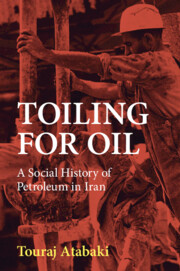Book contents
- Toiling for Oil
- Toiling for Oil
- Copyright page
- Dedication
- Contents
- Figures
- Maps
- Tables
- Note on Transliteration
- Preface and Acknowledgments
- Chronology
- Introduction
- 1 Oil Discovery and the Formation of a New Iranian Society
- 2 Oil and Labour in the First World War
- 3 Oil and Authoritarian Modernisation During Interwar Period
- 4 The Second World War: The Great Powers’ Rivalry for Oil
- 5 Poised to Leap: Towards Oil Nationalisation
- 6 Sovereignty’s Interlude: Iran’s Oil in 1951–1954
- 7 From Disparity to Planned Development: 1954–1962
- 8 Oil, Workforce, and the Developmental State: 1960s–1970s
- 9 Shop Floor Labour Activism: From the White to the Islamic Revolution
- Epilogue
- Notes
- Bibliography
- Index
5 - Poised to Leap: Towards Oil Nationalisation
Published online by Cambridge University Press: 28 November 2024
- Toiling for Oil
- Toiling for Oil
- Copyright page
- Dedication
- Contents
- Figures
- Maps
- Tables
- Note on Transliteration
- Preface and Acknowledgments
- Chronology
- Introduction
- 1 Oil Discovery and the Formation of a New Iranian Society
- 2 Oil and Labour in the First World War
- 3 Oil and Authoritarian Modernisation During Interwar Period
- 4 The Second World War: The Great Powers’ Rivalry for Oil
- 5 Poised to Leap: Towards Oil Nationalisation
- 6 Sovereignty’s Interlude: Iran’s Oil in 1951–1954
- 7 From Disparity to Planned Development: 1954–1962
- 8 Oil, Workforce, and the Developmental State: 1960s–1970s
- 9 Shop Floor Labour Activism: From the White to the Islamic Revolution
- Epilogue
- Notes
- Bibliography
- Index
Summary
The conclusion of the Second World War marked a significant turning point in global dynamics, particularly evidencing the decline of British global supremacy. Economic crises engendered by the war, coupled with the political repercussions of Indian independence, accelerated the dissolution of the British Empire. One salient indicator of this decline was Iran’s decisive move toward the nationalisation of its oil industry, a pivotal moment extensively analysed in this chapter. The Labour government in Britain, assuming power at the war’s end, aimed to revise its policies to maintain its monopoly in the Iranian oil sector by improving workers’ conditions. However, these efforts proved too limited and belated to effectively counter the rapid political developments in Iran, ultimately leaving Britain without a favourable strategic position in the Iranian context. The narrative then shifts to explore the working and living conditions within the Iranian oil industry in the late 1940s, highlighting the increasing poverty, entrenched housing, and health problems. It also examines the oil company’s response to the emerging labour movement and delves into the workers’ role in the nationalisation process. Additionally, the discussion encompasses the broader impacts of the withdrawal of British experts from Iran, focusing on the long-term effects on the lives and work of industry employees. These events significantly shaped the socio-economic landscape of the region and influenced the global power structures in the post-war era.
Keywords
- Type
- Chapter
- Information
- Toiling for OilA Social History of Petroleum in Iran, pp. 150 - 204Publisher: Cambridge University PressPrint publication year: 2024

